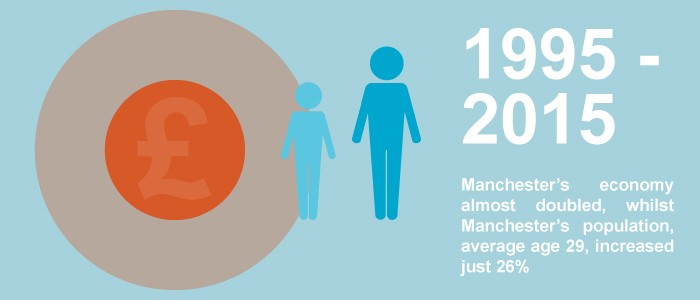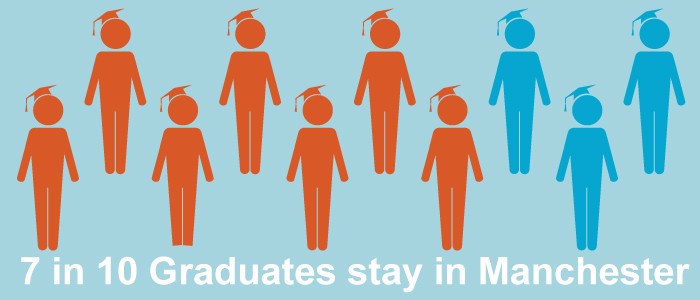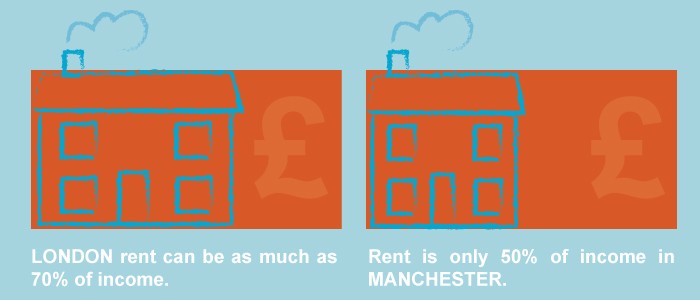Powering the North
Ahead of the BCFA’s first BCFA OPEN exhibition in Manchester in October, we look at the city’s continued growth prospects.
For proof of Manchester’s credentials as the leading creative hub outside London one need look no further than MediaCity, just a few miles outside the city in Salford Quays.
Twenty years ago this former docklands site was a largely deserted, derelict and forgotten quarter of the city region. Today, it is home not just to the likes of the BBC and ITV, but also to a growing mass of more than 200 companies in the digital and creative industries sector.
And it looks set to get bigger too. Earlier this summer detailed plans were submitted to double the size of the site over the next decade by creating up to ten new buildings with a development value of more than £1bn. Phase two of the project features 540,000 sq.ft of offices and 1,800 apartments alongside retail and leisure areas.
As Steven Underwood, chief executive of the Peel Group – the company which first began developing the site – says: “MediaCity is a shining example of what can be achieved across the Northern Powerhouse, combining the talents of great people with ambition and vision.”
Northern Powerhouse
Quite what the future of the ‘Northern Powerhouse’ project holds in the wake of the Brexit vote remains to be seen, especially given that George Osborne – the man who first launched the initiative – is no longer Chancellor of the Exchequer.
But talk to economic and political leaders across the city and they are pains to stress that, if anything, the referendum result should be seen as even more of an instruction to help further drive Manchester’s regeneration.
As Sir Richard Leese, Leader of Manchester City Council, says: “The prevailing economic uncertainty following the EU referendum result makes it even more essential that northern cities are given the tools and investment to work together to create the jobs and opportunities the region needs and help re-balance the nation’s economy.”
Digital technologies have long been seen as a key piece of the jigsaw that will help drive the northern economy, a region which has twice the population of London. Indeed, the recently published Northern Powerhouse Independent Economic Review identified the sector as one of a number of key “capabilities” in which the North is a world leader and which account directly for 30% of its jobs and 35% of its GVA (Gross Value Added). These capabilities also included advanced manufacturing, digital health innovation and energy.
Changing perceptions
Roger Belham, Commercial Director at Taylor’s Classics, a restorer and manufacturer of furniture for the bar, restaurant, hotel, café and pub markets, says the growth of MediaCity is certainly playing a key role in helping change perceptions of Manchester.
Taylor’s, which has historically supplied high-end gastropubs as well as country house hotels, is based an hour south of Manchester making the company ideally located to serve both London and northern cities.
Says Belham: “There has been a noticeable growth in the business hospitality trade outside London, and we are personally seeing a lot more business around cities such as Manchester, Birmingham and Leeds, and growing prosperity across the regions. I think this is partly down to London’s high property prices and some organisations looking to relocate out of the capital. But if you take a city like Manchester then the growth of MediaCity is starting to have an effect too in terms of the wider perception it portrays, while the city is already known for having some very good leisure operators. While the majority of our deliveries are still to the South East, there are a number of groups we are dealing with which have exhausted the potential of the South East and which are looking at opening outlets in the regions.”
Graduates
Getting these wider messages across to graduates will be key to ensuring that sectors such as design, technology, textiles and leisure continue to go from strength to strength in the regions.
To some extent the signs are already good. For instance, while less than half of its students come from the North West, seven in ten stay after graduation, usually in Greater Manchester.
Belham believes that given the cost of living in London there is every reason to suggest that these trends will continue. “The cost of living is having a huge impact for young people in London where rent can be as much as 70% of their income. If they see that their rent will only be, say, 50% of their income in Manchester then even that becomes a big draw.”
Ann Moult, HR Director at Johnson Tiles, says what is more difficult is getting across the benefits to graduates of moving to an area outside cities such as Birmingham, Manchester or Leeds to places such as Stoke-on-Trent where her company is based. “Larger cities are able to attract graduates. It is the more regional areas that have to work hard to attract the right candidates.”
Ann says it would be “advantageous” if the opportunities within the design and textile industries were promoted as part of the wider Northern Powerhouse discussion. She adds: “There needs to be a change of focus when having these discussions. For instance, when discussing the planned new high speed rail line HS2 all of the comments are about how much faster it will be to get to London. It should be about getting people out of the capital and into the rest of the country.”
Meanwhile Belham makes the wider point that it is still a challenge to get young apprentices interested in the sector in the first place. “If you train as an upholsterer or chair maker you have skills that will last a lifetime, and they are skills that are unlikely to ever be replaced by computers. But for whatever reason such craft skills are still not perceived as ‘cool’.”
Manchester facts
*Manchester’s office market in 2015 was bigger than the combined space let in Liverpool, Leeds, Hull, Sheffield and Newcastle.
*Manchester requires an extra 3m sq.ft of office space over the next 10 years if it is to keep up with the city’s forecast growth.
*The University of Manchester has more international students than any other UK university, and the largest student community in the UK.








